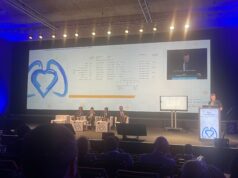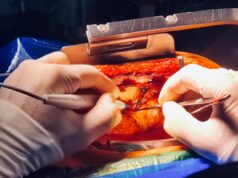
Research published in the Journal of Cardiothoracic and Vascular Anesthesia, assesses the effectiveness of the US Food and Drug Administration (FDA)-cleared Accuryn monitoring system (Protero Medical) to monitor kidney function, reduce the risks associated with catheter-associated urinary tract infections, and streamline nurse workflow.
The current study of 522 cardiac surgery patients across nine sites represents a sub-analysis of the Accuryn registry, an observational, multicentre study designed to evaluate the sensitivity, specificity, and advanced diagnosis time for acute kidney injury (AKI) provided by the Accuryn Alert system following cardiac surgery as compared to diagnosis based on routine serum creatine (SCr) measurements. The analyses demonstrate that Accuryn AKI Alerts diagnosed AKI, on average, 33 hours earlier than SCr (Stage 2 AKI).
Cardiac surgery-associated acute kidney injury is a common postoperative complication that affects 40% of patients, leading to increased mortality, extended hospital stays, and increased costs of care, Protero Medical states in a press release, citing research published in the journal Kidney360 in June 2024.
In cardiac surgery and other postoperative patients, excessive amounts of fluids administered can lead to SCr dilution, leaving clinicians with an inaccurate assessment on the patient’s kidney function.
Guidelines for AKI recommend initiating various supportive measures known as the kidney care bundle in patients at high risk in order to prevent the incidence and progression of AKI.
“We’re really pleased this study of over 500 patients confirms that the Accuryn monitoring system can help detect AKI hours before current standard criteria,” said Sanjay Banerjee, CEO of Accuryn Medical. “Early identification is vital for clinicians to optimise treatment plans and potentially improve patient outcomes and lower healthcare costs. In addition, this technology will become even more important as recent Centers for Medicare and Medicaid Services (CMS) policy changes take effect, requiring hospitals to report additional data on AKI, which it classifies as reportable hospital harm.”
The CMS recently identified AKI as a key indicator of patient safety, and will begin requiring hospitals to report on all incidences of AKI as reportable hospital harm.
CMS is also initiating a pilot alternative payment programme to promote better care coordination and optimal long-term health outcomes for patients. This programme, called the Transforming Episode Accountability Model (TEAM), is designed to hospitals responsible for the cost and care of patients who have undergone certain surgeries, including the first 30 days after they leave the hospital. The TEAM will affect cardiothoracic surgeons who perform coronary artery bypass grafts (CABG) and a limited number of other specialties.










